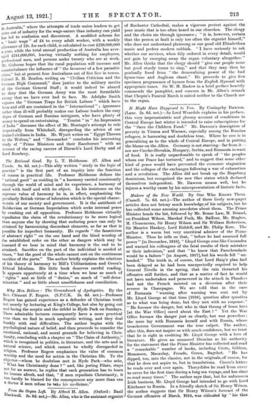Makers of the New World. By One Who Knows Them.
(Cassell. 7s. 6d. net.)—The author of these lively newspaper articles does not betray much knowledge-of his subjects, but he has collected some amusing anecdotes about them. The Primo Minister heads the list, followed by Mr. Bonar Law, M. Briand, ex-President Wilson, Marshal Foch, Mr. Balfour, Mr. Hughes, M. Clemenceau, Sir Henry Wilson and Sir William Robertson, Sir Maurice Hankey, Lord Riddell, and Mr. Philip Kerr. The author is a warm but very uncritical admirer of the Prime Minister. Thus he tells us that, " before he had assumed full power " [in December, 1916], " Lloyd George rose like Cassandra and warned his colleagues of the fatal results of their mistakes or their indecision," and that " he knew that Passchendaele would be a failure " [in August, 1917], but his words fell " un- heeded." The truth is, of course, that Lord Haig's plan had been delayed as he had been unexpectedly required to help General Nivelle in the spring, that the rain thwarted his offensive still further, and that as a matter of fact he would not have undertaken and persevered in the attack in Flanders had not the French insisted on a diversion after their reverse in Champagne. We are told that in the case of Rumania " warning after warning was sent out by Mr. Lloyd George at that time [1916], question after question as to what was being done, but they met with no response." " He foresaw the danger, but who in that throng of brass hats [at the War Office] cared about the East ? " Yet the War Office foresaw the danger just as clearly, but was powerless ; the issue lay with Rumania herself and with Russia, whose treacherous Government was the true culprit. The author, after this, does not inspire us with much confidence, but we trust that he is right in crediting Mr. Lloyd George with a love of literature. He gives an unnamed librarian as his authority for the statement that the Prime Minister has collected and read a " remarkable " number of books, including Grote, Gibbon, Mommsen, Macaulay, Froude, Green, Bagehot. " He has dipped, too, into the classics, not in the originals, of course, for that he does not aspire to, but in translations. Cicero's letters he reads over and over again. Thucydides he read from cover to cover for the first time during a long sea voyage, and has since re-read many times." The author says that, but for unforeseen Irish business, Mr. Lloyd George had intended to go with Lord Kitchener to Russia. In a friendly sketch of Sir Henry Wilson, the author suggests that Sir Henry Wilson's forecast of the German offensive of March, 1918, was ridiculed by " his then superiors in the military hierarchy." That is the exact reverse of the facta. The soldiers knew very well when and where Ludendorff was going to attack ; it was the politicians, headed by the Prime Minister, who were incredulous and over-confident, and who therefore declined to send reinforcements from home to strengthen General Gough's weak line. One may well despair of ever getting history better taught when one sees recent events so completely travestied as they are—perhaps for political reasons—in this book.



































 Previous page
Previous page